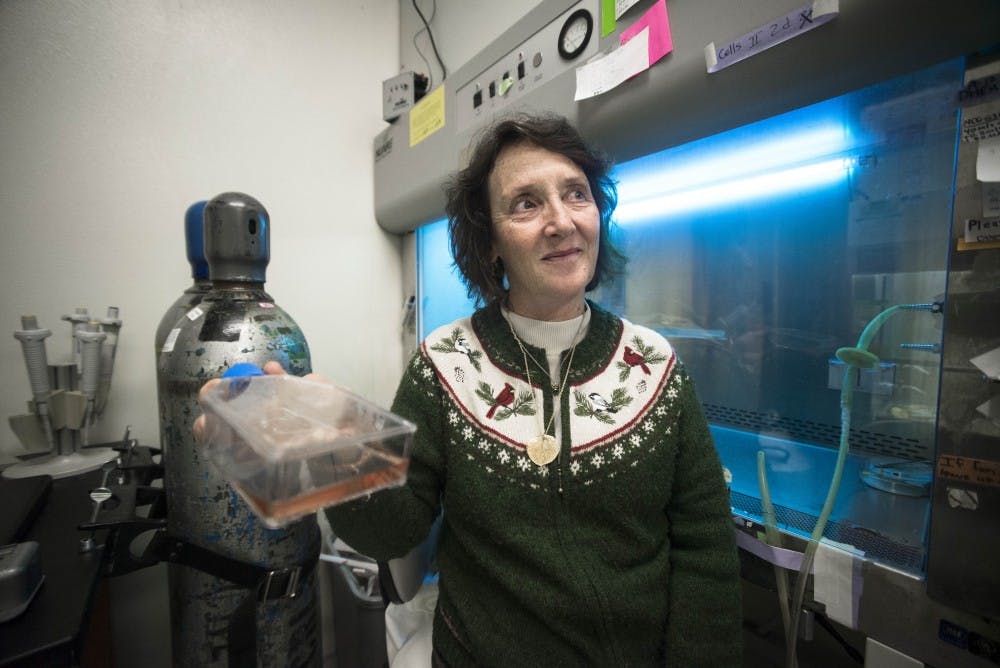assistant-news@dailylobo.com
@ChloeHenson5
A UNM professor aims to inspire students and faculty to study in central Europe.
The Deutscher Akademischer Austauschdienst (German Academic Exchange Service) selected Angela Wandinger-Ness, a UNM professor of pathology, as a research ambassador to Germany.
According to the DAAD website, the ambassadors are scholars and scientists who have experience researching in Germany and are “interested in promoting research in Germany at their home universities and among their peers and students.”
Wandinger-Ness said she worked in Heidelberg, Germany for six years after she finished her Ph.D. in the United States at UCLA.
She said she also received a visiting professorship at the Max Planck Institute, a research organization in Germany.
At UNM, she has worked on enzymes called GTPases, which act as “molecular switches” that regulate the movement of molecules and the skeletons of cells. She said she has focused her research on these enzymes to help study how certain diseases work.
“In diseases, (GTPases are) either defective or there is too much of them, or they’re turned on all the time, or they’re not turned on at all,” she said. “Any of those options are bad because you have to have dynamicness.”
Wandinger-Ness said the diseases she has looked at include ovarian cancer, polycystic kidney disease and an inherited form of a neurological disease that impairs sensory input from the fingers and toes.
She said the German federal government distributed money through universities and research institutes to allow undergraduate and graduate students and faculty to study and work in Germany.
“The reason they’re doing this is because German science was always extremely well known in the ‘50s for physics,” she said.
“But for biological sciences, it has not gained as much recognition as they would like, even though science in Germany is done at a very high level. They’re really doing this as a promotion to get exchange going.”
Get content from The Daily Lobo delivered to your inbox
Wandinger-Ness said that although she will be representing only the sciences, the DAAD works with students in different fields.
She said there are a variety of programs in Germany for UNM students to attend.
“It just depends on what they’re interested in and how much time they can spend,” she said.
The German government will provide stipends to help students conduct research and study in Germany, she said.
Wandinger-Ness said she may organize events next semester to pique student interest, such as an ice cream social or a booth at a main-campus open house or career fair. She said she has to report progress she makes to the DAAD.
“I keep an Excel sheet of all the things that I’ve done,” she said. “I write a report at the end of every semester that tells them what I’ve done (and) roughly how many students I’ve talked to.”
Wandinger-Ness said she has spoken to some students and faculty to spread the word about DAAD and opportunities offered in Germany.
Students should research and study in Germany because study abroad provides students with important experience, Wandinger-Ness said.
She said schools in Germany also have a high standard for education.
“The education is at a pretty high level, so you get pretty high training in research, sciences or any of the academic disciplines,” she said. “It’s actually hard to get into a German university. There’s a pretty strong selection process.”
Maggie Werner-Washburne, a UNM Regents’ professor of biology, said it’s important for students to take advantage of the opportunities offered at UNM and to recognize the faculty members who provide them.
“We have a lot of faculty who do these things to provide opportunities to students,” she said.
Werner-Washburne said study in Germany could provide a great opportunity for students to broaden their horizons. She said a degree in hard sciences could be useful depending on what a student does with it.
“Science is international,” she said. “Any opportunity to get our students in that area is fantastic.”






